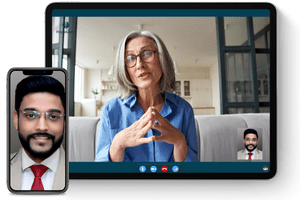Very often, stress is renamed as
anxiety
when spoken. Hence, understanding first what you are going through is
important- is it stress or anxiety? A stress response is brought about in an
emergency state when an individual’s stable internal state is threatened.
During this, a person initiates mixed reactions that include behavioral and
physiological responses. On the other hand, according to the DSM-5 (2013),
“Fear is the emotional response to a real or perceived imminent
threat, whereas anxiety is the anticipation of a future threat.” Thus, anxiety can be defined as a
temporarily diffused emotional state triggered by a hypothetically/possibly
harmful situation, with a very low or perhaps uncertain chance of happening
(Goes et al., 2018).
Moreover, facing stress or anxiety to a small degree is considered to be
positive as it encourages optimal
behavioral functioning
and enhances thought processes. However, if these levels are extended from
average can disrupt day-to-day activities. Once it passes the standard
level, it can become frustrating and might lead to chronic anxiety/ anxiety
disorders.
You are wondering what may have caused you to be anxious. Genetics is a
primary factor; some people are born with it. If not nature, then nurture,
then the environment can play a significant role; if one or more family
member(s) suffers from anxiety, then you are highly likely to pick it up. Another cause can be a huge
life event or experience. A bad experience/ trauma, such as abuse or losing
a loved one, may develop anxiety. Additionally, consuming high doses of
drugs and alcohol can stem from anxiety (MH-UK, n.d.).
Non-clinical anxiety has the following mental and physical symptoms:
-
Racing thoughts
-
Excessive sweating
-
Difficulty sleeping
-
Fast breathing
-
Highly alert all the time
-
Stomach aches and headaches
-
Difficulty in concentrating
-
Fatigue
-
Uncontrollable overthinking
-
Shaking (fidgety legs and hands)
If you are someone who faces these issues, then you are not alone. General
anxiety is highly common. 1 in 3 people has anxiety, according to WHO
(n.d.). Lots of people with anxiety turn towards quick fixes and pop pills
to reduce or stop their anxiousness. However, this is just temporary. There
are ways to reduce your anxiety without medication that works in the long
run.
Face your fears
We tend to begin avoiding situations where we know we may face some
troubles. Due to this, you will stop doing those things that you want or
need to do. If you avoid those tasks, you may begin to avoid tasks similar
to them, and you will miss out on understanding and
managing your fear
and anxiety and finally reducing them. Hence, these may become a pattern,
and exposing yourself to your fears can help overcome your anxiety. It is
challenging as it sounds, and so you can make your way upward by exposing
yourself initially to fears you expect not to be very harmful. That is when
you can build trust and address such fears or beliefs about your
anxiety.
Write it down
Writing journals have shown to improve various aspects of personal health.
Adams (1998) note that journaling can be a form of therapy for growth and
healing psychologically. Keep a diary to record your anxious thoughts- of
when they happened (triggers) and what happens (behavior). Once it is out of
your mind on paper (or even digitally), it will make it less daunting.
Physical exercise
There are numerous benefits of exercise for physical health. But there are
even more benefits of exercising for your mental health. Exercising has been
shown to alleviate stress and anxiety (Arent, Walker, & Arent, 2020). While
exercising, your body and mind are combined and concentrated. This can shift
your focus from your fears and anxiety.
Relaxation and nutrition
Learn a few relaxation techniques, such as meditation and breathing
exercises. There are guided videos online if meditating by yourself is
difficult initially. Meditation and breathing mindfully can help calm and
drop your shoulders in any anxious situation in no time if you have good
practice of it. Additionally, caffeine and sugars increase your anxiety
levels (Mind, 2010) as they give your nervous system a jolt, and when you
are under anxiety, your nervous energy can boost an attack. Hence, moderate
the levels of caffeine and sugar in your
diet .
Even other small things can help you cope with your anxiety, such as sleep;
a minimum of 6-8 hours is essential for psychological well-being. If you are
religious or spiritual, connecting with something superior can help you with
coping healthily.
Managing anxiety is hard, but there are many ways you can win this battle.
You can initiate non-medication techniques to improve your well-being. If
your anxiety does not get in control or worsens even after that, consider
consulting a therapist. Also, remember that anxiety does not have control over your life.
Online Counselling & Therapy
Get help for
anxiety, depression, and other mental health issues
